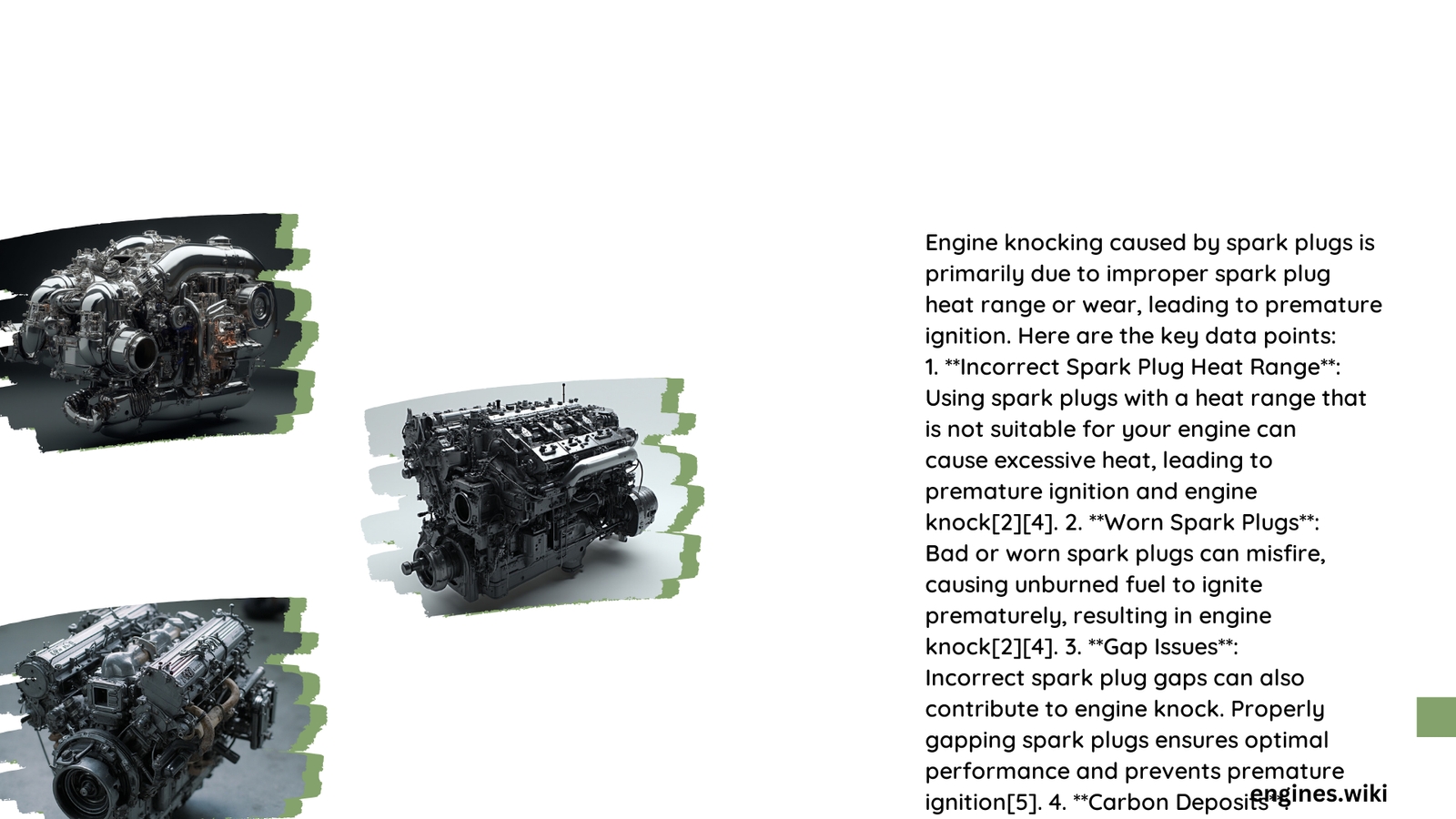Engine knocking caused by spark plugs is a common issue that can lead to serious engine damage if left unaddressed. This problem occurs when spark plugs fail to ignite the fuel-air mixture properly, resulting in delayed combustion and a characteristic knocking sound. Understanding the symptoms, causes, and solutions for spark plug-related engine knocking is crucial for maintaining your vehicle’s performance and longevity.
What Are the Main Symptoms of Engine Knocking Caused by Spark Plugs?
Engine knocking caused by spark plugs can manifest in several ways:
- Distinct knocking sound, especially during acceleration
- Engine misfires
- Rough idling
- Decreased fuel efficiency
- Loss of engine power
- Check Engine Light illumination
These symptoms may vary in intensity depending on the severity of the spark plug issue and the specific engine conditions.
How Do Faulty Spark Plugs Lead to Engine Knocking?

Faulty spark plugs can cause engine knocking through several mechanisms:
-
Delayed ignition: When spark plugs fail to ignite the fuel-air mixture at the correct time, it can lead to delayed combustion, causing a knocking sound.
-
Weak spark: Worn or damaged spark plugs may produce a weak spark, resulting in incomplete combustion and engine knocking.
-
Pre-ignition: In some cases, faulty spark plugs can cause the fuel-air mixture to ignite before the piston reaches the top of its compression stroke, leading to knocking.
-
Carbon buildup: Excessive carbon deposits on spark plugs can interfere with proper ignition, causing misfires and knocking.
What Are the Primary Causes of Spark Plug-Related Engine Knocking?
Several factors can contribute to spark plug issues that lead to engine knocking:
-
Wear and tear: Over time, spark plugs naturally degrade, affecting their performance and potentially causing knocking.
-
Incorrect gap: Improper spark plug gap can lead to weak or inconsistent sparks, resulting in engine knocking.
-
Carbon buildup: Excessive carbon deposits on spark plugs can interfere with proper ignition.
-
Heat range mismatch: Using spark plugs with the wrong heat range for your engine can cause pre-ignition and knocking.
-
Physical damage: Cracked or broken spark plugs can lead to compression loss and engine knocking.
How Often Should Spark Plugs Be Replaced to Prevent Engine Knocking?
The frequency of spark plug replacement varies depending on the type of spark plugs and vehicle specifications:
| Spark Plug Type | Recommended Replacement Interval |
|---|---|
| Copper | 30,000 – 50,000 miles |
| Platinum | 60,000 – 100,000 miles |
| Iridium | 80,000 – 120,000 miles |
Always consult your vehicle’s owner manual for specific recommendations, as some high-performance engines may require more frequent spark plug replacements.
What Role Does Fuel Octane Play in Spark Plug-Related Engine Knocking?
Fuel octane rating plays a significant role in preventing engine knocking, including those caused by spark plug issues:
- Higher octane fuel is more resistant to pre-ignition and can help reduce knocking in engines designed for it.
- Using fuel with a lower octane rating than recommended can exacerbate knocking issues, especially in high-compression engines.
- Even with properly functioning spark plugs, using the wrong octane fuel can lead to engine knocking.
It’s essential to use the fuel octane rating recommended by your vehicle manufacturer to minimize the risk of engine knocking.
How Can You Diagnose Spark Plug-Related Engine Knocking?
To diagnose spark plug-related engine knocking:
- Listen for a distinct knocking sound, especially during acceleration.
- Check for engine misfires or rough idling.
- Monitor fuel efficiency and engine performance.
- Use an OBD-II scanner to check for misfire-related error codes.
- Visually inspect the spark plugs for signs of wear, damage, or carbon buildup.
What Are the Steps to Replace Spark Plugs and Resolve Engine Knocking?
Follow these steps to replace spark plugs and potentially resolve engine knocking:
- Gather necessary tools (spark plug socket, ratchet, gap tool)
- Locate and access the spark plugs
- Remove the old spark plugs carefully
- Check and adjust the gap on the new spark plugs if necessary
- Install the new spark plugs, taking care not to overtighten
- Reconnect any removed components
- Start the engine and listen for improvements
Always refer to your vehicle’s service manual for specific instructions and torque specifications.
Can Other Engine Components Contribute to Knocking Similar to Spark Plug Issues?
Yes, other engine components can cause knocking sounds similar to spark plug-related issues:
- Worn connecting rod bearings
- Damaged pistons or piston rings
- Faulty fuel injectors
- Malfunctioning knock sensors
- Timing chain or belt issues
It’s important to accurately diagnose the source of engine knocking to ensure proper repairs are made.
What Are the Long-Term Consequences of Ignoring Spark Plug-Related Engine Knocking?
Ignoring spark plug-related engine knocking can lead to severe consequences:
- Increased engine wear and damage
- Reduced fuel efficiency
- Loss of engine power and performance
- Catalytic converter damage
- Potential engine failure requiring costly repairs or replacement
Addressing spark plug issues promptly can prevent these long-term problems and extend the life of your engine.
How Can Regular Maintenance Prevent Spark Plug-Related Engine Knocking?
Regular maintenance can significantly reduce the risk of spark plug-related engine knocking:
- Follow the manufacturer’s recommended spark plug replacement schedule
- Use high-quality spark plugs designed for your specific engine
- Regularly check and adjust spark plug gaps as needed
- Keep the engine clean and well-maintained to prevent carbon buildup
- Use the recommended fuel octane rating for your vehicle
- Address any engine performance issues promptly
By following these maintenance practices, you can help ensure your engine runs smoothly and avoid the costly consequences of spark plug-related engine knocking.
